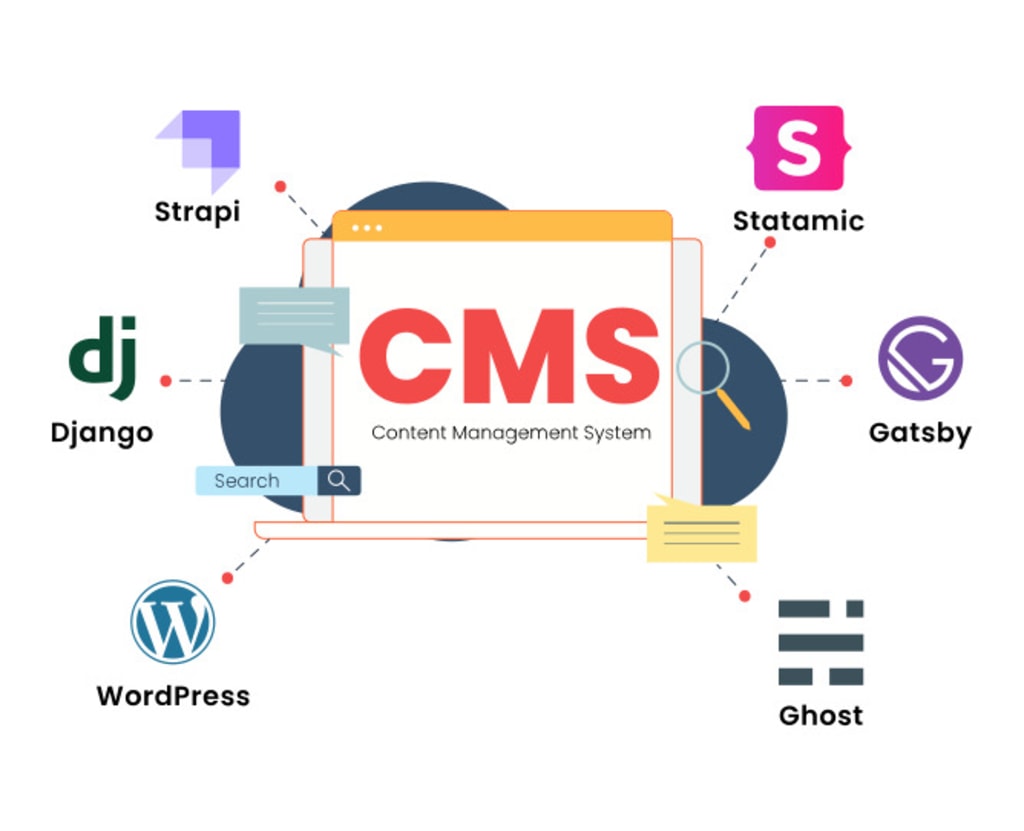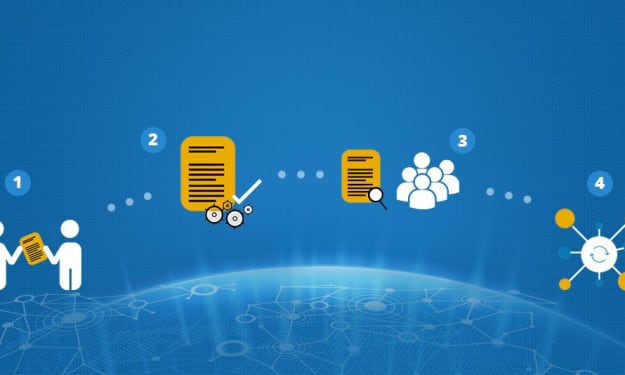Outsourcing vs. In-House CMS Development: Making the Right Decision
When it comes to managing your website's content effectively, choosing the right approach is crucial.

Introduction
When it comes to managing your website's content effectively, choosing the right approach is crucial. Content Management Systems (CMS) play a pivotal role in this process. The big question that arises is whether to outsource CMS development to a professional company or handle it in-house. Both options have their merits and demerits, making the decision complex. In this blog, we will delve into the advantages and disadvantages of outsourcing CMS development to a CMS development company versus handling it internally. By the end, you will have a clearer understanding of which route suits your specific needs best.
Understanding Outsourcing and In-House CMS Development
In the world of website and software development, CMS (Content Management System) plays a crucial role in managing and organizing digital content. When it comes to CMS development, two common approaches are outsourcing and in-house development. Let's explore these concepts in a simple and easy-to-understand manner:
1. Outsourcing CMS Development:
- Definition: Outsourcing is when a company or individual hires an external CMS development company or service to handle the creation of their content management system.
- How It Works:
- The company seeking a CMS hires a specialized external team for development.
- The external team handles all aspects of CMS development, from planning to coding and testing.
- Communication happens remotely, often through emails, video calls, or project management tools.
- Benefits of Outsourcing CMS Development:
- Cost-Effective: Outsourcing can be more affordable as it avoids the need to hire full-time developers or maintain an in-house team.
- Access to Expertise: CMS development company are specialized in their field, bringing extensive knowledge and experience to the project.
- Faster Turnaround: With dedicated teams, outsourcing can lead to quicker development and deployment of the CMS.
1. In-House CMS Development:
- Definition: In-house development refers to a company creating its own CMS internally using its resources and staff.
- How It Works:
- The company assigns its own team of developers, designers, and project managers for the CMS project.
- Development takes place within the company's premises and is overseen by internal stakeholders.
- The team works collaboratively and can communicate directly for better coordination.
- Benefits of In-House CMS Development:
- Customization: In-house development allows for full customization to meet specific business needs and requirements.
- Control and Security: Companies have complete control over the development process and can ensure data security and compliance.
- Long-Term Investment: Building an in-house CMS can be a valuable long-term asset, as it becomes an integral part of the company's infrastructure.
Pros and Cons of Outsourcing CMS Development
Outsourcing CMS development means hiring a third-party company to handle the creation and maintenance of your website's content management system. Let's explore the advantages and drawbacks of this approach:
Advantages of Outsourcing CMS Development:
- Cost Savings: Hiring an external CMS development company can be cost-effective as you don't need to invest in infrastructure, training, or additional staff.
- Access to Expertise: Outsourcing provides access to a pool of skilled developers with specialized knowledge and experience in CMS development.
- Time Efficiency: A dedicated CMS development team can complete the project faster, freeing your in-house team to focus on core business tasks.
- Latest Technologies: Reputable CMS development services stay updated with the latest trends and technologies, ensuring your website benefits from modern features and security.
- Scalability: Outsourcing allows you to scale up or down your CMS development needs based on your business requirements.
Drawbacks of Outsourcing CMS Development:
- Communication Challenges: Working with an external team may lead to communication gaps, potentially affecting project understanding and progress.
- Dependency on External Parties: Relying on an external CMS development company can cause delays or disruptions if they face issues or delays on their end.
- Security Concerns: Sharing sensitive data with an external party may raise security and confidentiality concerns, necessitating robust data protection measures.
- Lack of Control: Outsourcing means you have less direct control over the development process, which might affect customization and adjustments.
- Cultural Differences: If the outsourced team operates in a different cultural context, it can lead to misunderstandings or varying work approaches.
Pros and Cons of In-House CMS Development
In-house CMS development refers to the process of creating a Content Management System (CMS) internally within a company or organization rather than outsourcing it to a CMS development company. Let's explore the advantages and disadvantages of this approach:
Pros of In-House CMS Development:
1. Better Control: When you develop a CMS in-house, you have full control over its design, features, and functionality. It can be tailored precisely to meet your specific needs and requirements.
2. Customization: In-house development allows you to customize the CMS according to your organization's unique workflows and processes. This flexibility can enhance productivity and user experience.
3. Security: With an in-house CMS, you can implement stringent security measures and ensure data protection. This is especially crucial when dealing with sensitive information.
4. Integration: An internally developed CMS can be seamlessly integrated with your existing systems, such as databases, customer relationship management (CRM) tools, and other software.
5. Timely Updates: You can control the update schedule and quickly address any issues or bugs, ensuring that the CMS remains efficient and up-to-date.
Cons of In-House CMS Development:
1. Higher Costs: Developing a CMS in-house can be expensive. It requires skilled developers, project managers, and quality assurance personnel, leading to higher upfront and ongoing costs.
2. Resource Allocation: Building a CMS from scratch demands a significant allocation of time and resources, which may affect other critical projects and initiatives.
3. Expertise and Skill: In-house development requires a team of experienced developers with CMS development expertise. If your team lacks the necessary skills, the project might encounter delays or quality issues.
4. Maintenance and Support: After the CMS is deployed, ongoing maintenance and support become your responsibility. This can be challenging if your team is not well-equipped to handle such tasks.
5. Lack of Diverse Perspectives: External CMS development companies have experience working with various clients and industries, offering a broader perspective. In-house teams may miss out on fresh ideas and best practices.
Key Factors to Consider for Decision-Making
When deciding between outsourcing CMS development services or keeping it in-house, several crucial factors need to be considered. Let's explore these factors and their impact on the decision-making process:
1. Project Complexity:
- Evaluate the complexity of the CMS development project. Is it a simple website or a more intricate application with advanced features?
- Consider whether your in-house team has the expertise to handle the complexity effectively or if specialized skills are required.
2. Budget:
- Assess your budgetary constraints for CMS development.
- Compare the costs of outsourcing versus maintaining an in-house team, including salaries, benefits, infrastructure, and ongoing training.
3. Timeline:
- Analyze the project's timeline and urgency. Do you have strict deadlines that need to be met?
- Outsourcing CMS development may offer quicker turnaround times as specialized agencies often have dedicated teams and experience in timely deliveries.
4. Team Expertise:
- Evaluate the expertise of your in-house team. Do they have the necessary skills and experience to handle the CMS development project efficiently?
- Consider the learning curve and potential risks associated with an in-house team working on a project that might be outside their comfort zone.
5. Quality and Standards:
- Determine the level of quality and industry standards required for your CMS development.
- Research the reputation and track record of potential outsourcing partners to ensure they meet your quality expectations.
6. Resource Scalability:
- Anticipate future project requirements and potential fluctuations in workload.
- Outsourcing offers the advantage of easily scaling resources up or down based on project demands.
7. Communication and Collaboration:
- Assess your organization's ability to communicate and collaborate effectively with an outsourced team, especially if they are in a different time zone or location.
- Consider the level of involvement and control you need over the development process.
8. Data Security and Privacy:
- Evaluate the sensitivity of the data involved in your CMS development project.
- Choose a reputable outsourcing partner with robust security measures to safeguard your information.
Conclusion
Deciding between outsourcing CMS development to a dedicated company or developing it in-house is a significant choice for any business. While outsourcing offers access to specialized skills, cost-effectiveness, and quicker implementation, in-house development provides more control, customization, and long-term savings. Ultimately, the right decision depends on your business's unique requirements, budget, and timeline. Consider the pros and cons we've explored in this blog, weigh them against your priorities, and make an informed choice to ensure your website's content management is seamless and successful.
About the Creator
Mukesh Ram
I founded Acquaint Softtech Private Limited with a vision to make quality developers affordable to everyone. With my blood, sweat, and tears I haven’t just been able to sustain but thrive over the years.






Comments (1)
Mukesh Ram is not accepting comments at the moment
Want to show your support? Send them a one-off tip.